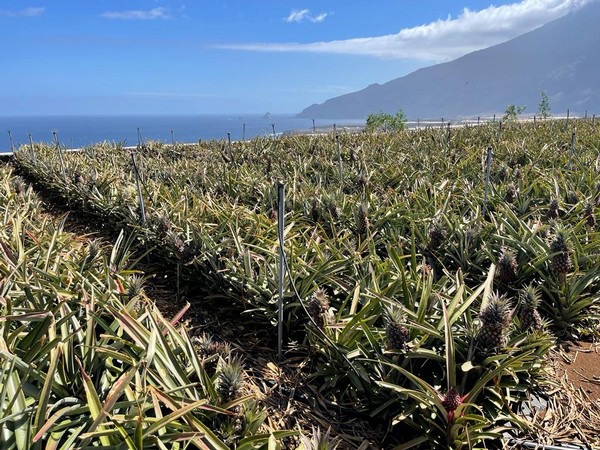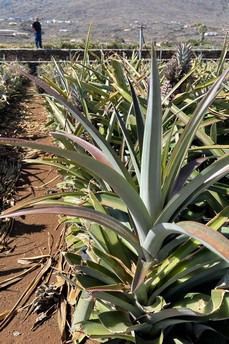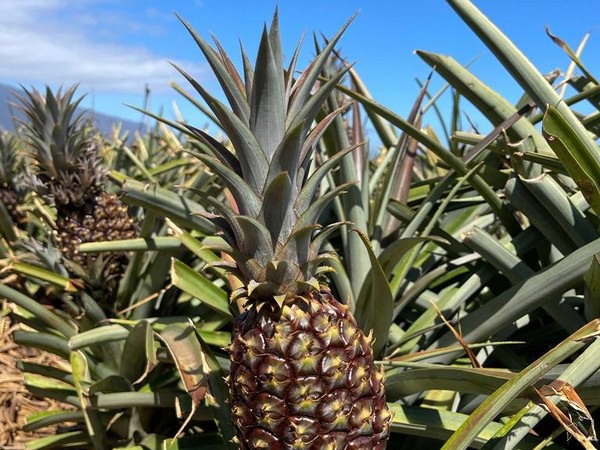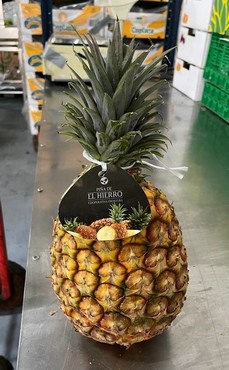Without a doubt, pineapples are one of Spain's most imported tropical fruits. Faostat data indicate that in 2021 the fruit was, in fact, the third most purchased item among the main tropical species, only behind bananas and avocados. However, the country also has its own production, and although, for now, the production is consumed only in its place of origin, the Canary Islands, many of us hope that one day its marketing will reach the Peninsula.

"This season, we at Cooperativa Frontera expect to produce between 800,000 and 900,000 kilos of pineapples," said Fabio Toledo. "It is a smaller amount than we have produced in other years, as in 2019 alone we reached 1,200,000 kilos."

"We are dealing with quite a lot of pressure from pests because of the cochineal, which transmits a virosis that causes the plant to wilt and results in plantations that should be producing pineapples for up to 5 years having to be uprooted after the second harvest."
"Ants carry the cochineal between the plants, spreading the pest, moving under the plastics we use for the cultivation of tropical pineapples here in El Hierro. But the biggest problem is that, as of today, we do not have access to any active materials developed to tackle this pest in pineapple cultivation. In 2019, it was still perceived as just a threat, but in 2023 the problem has already become a reality, and the decline is evident," says Fabio. "Even though our cooperative's production area is supposed to have expanded compared to 2019, to a total of 80 hectares, our yields have fallen from 1.4 kg/m² then to 1.1 kg/m² today."
El Hierro has a year-round pineapple production thanks to the planning of the cooperative's producers, who are thus able to supply the Canary market during the 12 months of the year. The import of foreign pineapples is not allowed for phytosanitary reasons. "The cold snap in January, which caused night temperatures to drop to 12 degrees Celsius, slowed the fruit's ripening and the harvest scheduled for January is starting to be harvested now, but in no case have we suffered losses due to the cold."

In spite of these adversities, Fabio says that "Cooperativa Frontera is the main pineapple producer in Spain, and I would dare say in all of Europe, and we are working to ensure we retain that status."
"For now, we will continue to sell our Spanish Red pineapple only in the Canary archipelago, because, due to a price issue, we find it difficult to compete against imported pineapples in the Peninsula. The production costs in the field already reach up to 1.5 Euro per kilo, to which we have to add the cost of transport."

"But we must recall that the same thing happens with Canary and imported bananas, and that despite their higher price, Canary bananas are in good demand and highly appreciated by Spanish consumers," said the agricultural technician of Cooperativa Frontera. "The same could eventually happen with Spanish Red pineapple from the Canary Islands and the imported MD2. However, for this possibility to be considered, it would first be necessary to expand the production in the islands."
 For more information:
For more information:
Cooperativa Frontera
El Matorral s/n
Frontera, El Hierro
Santa Cruz de Tenerife. Spain
Tel.: +34 922 556 016
[email protected]
www.cooperativafrontera.com










